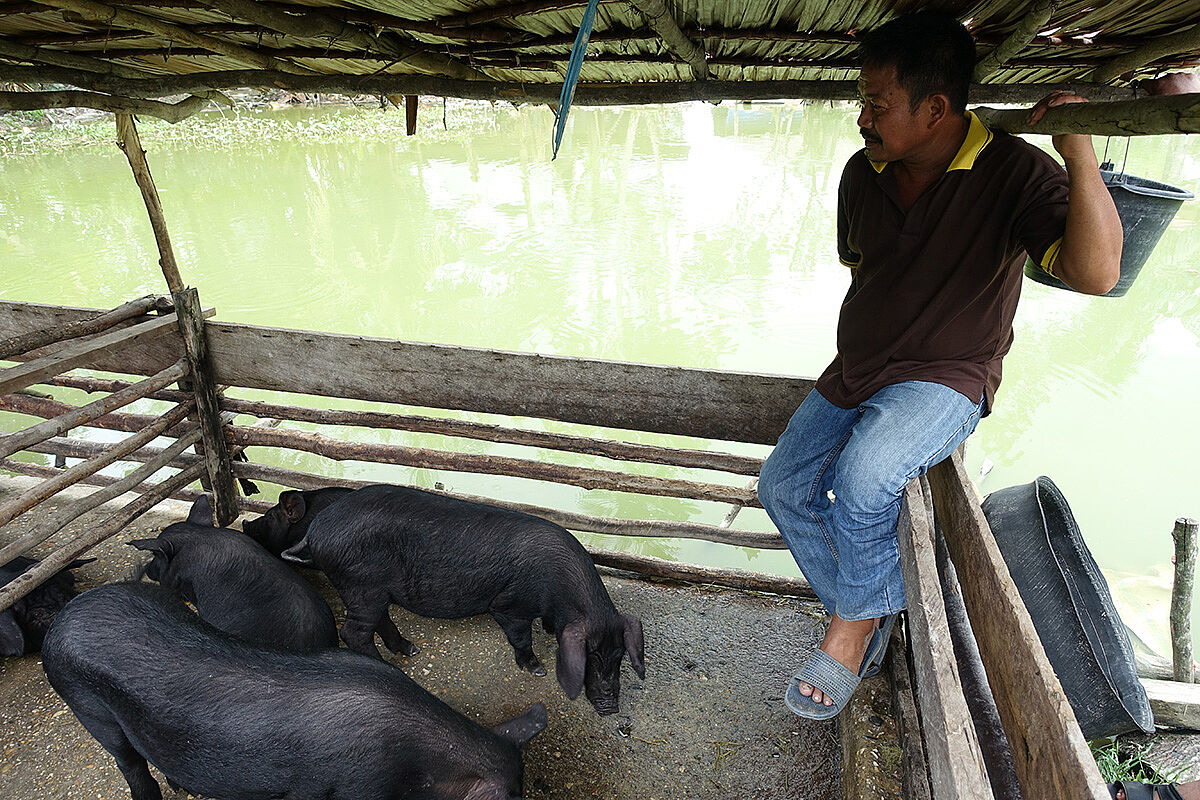Evangelische Bank eG
IBAN: DE85 5206 0410 0000 0001 24
BIC: GENODEF1EK1
Indonesia: Pig Farming Improves Livelihoods
Many people in West Sulawesi live from traditional agriculture and raising livestock. Their income is low and many families suffer because of this. The Christian Church of West Sulawesi (GKSB) is now striving to improve the situation by setting up a training centre for pig farming in order to provide better livelihoods for as many people as possible.
The Christian Church of West Sulawesi (GKSB) has about 19.300 members. Most of them live in rural areas and earn their living from traditional agriculture and raising livestock. The demand for pork is on the rise. Unfortunately, farmers are unable to increase their earnings from raising livestock because they lack knowledge about modern rearing methods. Most of them only just make enough to meet their basic needs. The GKSB is therefore launching a pig-farming project.
Knowledge transfer sustainably improves the quality of life
A training centre is being set up in one of the project communities to teach local farmers about modern, sustainable and animal-friendly pig farming. With this knowledge, the farmers participating in the project can increase their earnings from pig breeding and improve the living standards of their families. Another measure is to introduce an eco-friendly waste management system to convert the waste from pig farming into fertiliser. This fertiliser is in turn spread onto the fields to increase crop yields and ultimately improve the financial situation of farmers as a whole. In addition, pig feed, which must be purchased at the start of the project, is gradually being produced by the farmers themselves and this leads to further increases in earnings. The training centre itself also earns money by rearing and selling pigs. This money is channelled into a new centralised church payroll office and ultimately benefits GKSB pastors.
Indonesien
70% of rural households in Indonesia depend on agriculture for their livelihoods.

Help for as many as possible
The project is initially planned for five years and is under the supervision and control of the GKSB Synod Council. It is intended to benefit as many people as possible. The church hopes that the training will enable pig farmers to double their income. Both women and men are employed at the training centre. The fertiliser produced also benefits vegetable farmers. In addition, since the church runs the training centre as a non-profit organisation, it helps to stabilise the salaries of active and retired pastors of the GKSB, thus increasing the attractiveness of the ministry as a profession and ultimately benefiting every congregation.
The Christian Church of West Sulawesi (GKSB) is helping farmers to double their earnings from livestock farming. This approach also unlocks a number of potential synergies. Jobs are being created for both men and women at the new training centre. Vegetable farmers are receiving fertiliser for their fields. Pastors receive financial security for their salaries. It allows many families to achieve a financially stable standard of living.
The GKSB has built a new training centre to train farmers in modern, sustainable and animal welfare-oriented methods of pig farming. The church is also introducing an eco-friendly waste management system to convert the waste from pig farming into fertiliser. This allows farmers to produced their own pig feed.
The Christian Church of West Sulawesi (GKSB) split from the Toraja Mamasa Church in Sulawesi in 1977 due to the enormous distances involved. Its 20.000 members live in 105 congregations in the rural areas of West, South and Central Sulawesi. They are served by 44 male ministers and five female ministers. In 2012, the GKSB founded a Theological College to remedy the most pressing problem of the lack of ministers. At present, 80 young people attend the college.
We are pleased to hear that you are interested in this project. If you have any general questions, please use the contact form below. We are also happy to help you personally if you have any questions or require further information – by phone or by E-mail.
Djoko P. A. Wibowo
Liaison Secretary Indonesia
+49 711 636 78 -36